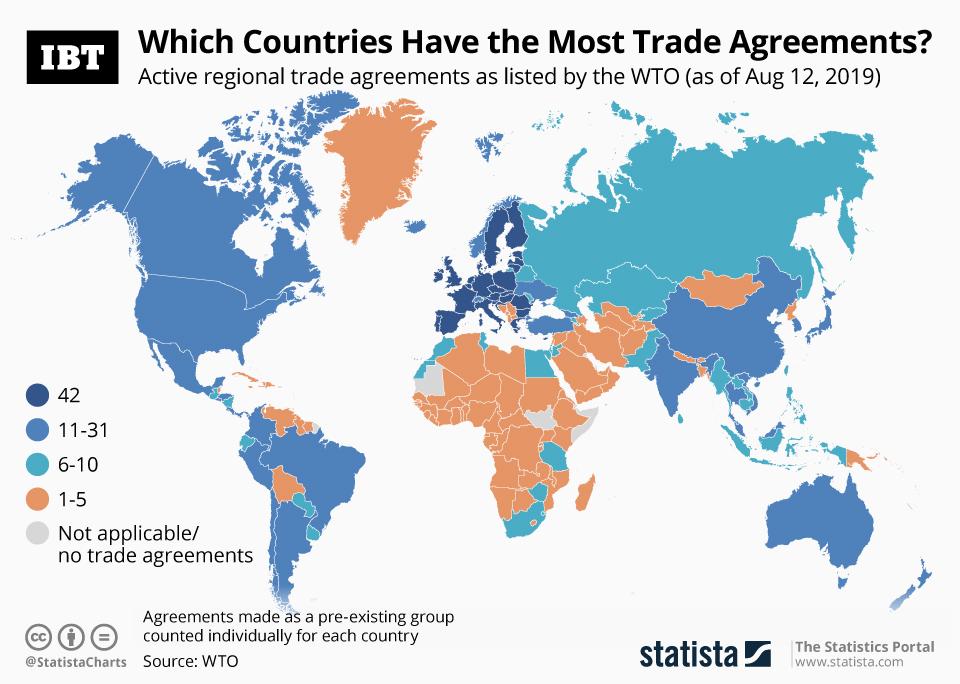Many emerging economies – from the Middle East & Africa (MEA) to Latin America to parts of Asia – have seen great economic growth and the rise of digital transformation. Even before COVID-19, the increase and potential of cross-border digital transactions – such as with the likes of financial technologies (or fintech) – has grown; the pandemic further accelerated that.
For those that follow international trade news, a major headline has been the new African Continental Free Trade Agreement (AfCFTA) that began into force this year. It brings the majority of African Union member countries, which the continent as a whole is home to over 1.3 billion people, a free trade agreement. Free trade agreements are nothing new, but specifically with emerging economies, how can they use it to their advantage by promoting overall economic development and also opening digital borders ?
OVERVIEW OF FREE TRADE

Simply, a Free trade Agreement (FTA), according to the International Trade Administration (ITA), is an agreement between two or more countries that agree on something pertaining to trade in goods and services. Topics that can be covered and could be protected include the likes of intellectual property rights, protections of certain industries – to name a few. Examples include the likes of the former North American Free Trade Agreement (NAFTA) – now known as the United States–Mexico–Canada Agreement (USMCA) that was championed by former US President Donald Trump.
An FTA also sets a foundation for more integrated relations that can stem into a customs union – such as South America’s MERCOSUR and even more intertwined such as the European Union (EU).
CURRENT COMPLICATIONS – COVID AND DIGITAL TRANSFORMATION

The pandemic and pre-pandemic times showcased the general need for strong digital infrastructure. However, unique in many emerging economies is the rise of fintech out of necessity. For instance, The Fintech Times’s Fintech: the Middle East and Africa 2021 Report highlighted in East Africa, home to countries such as Kenya, having the region boosts some of the world’s highest mobile penetrations in the world. This has been evidenced by M-PESA – one if not the continent as a whole’s – success stories in bring financial technology solutions to the masses via mobile phones.
In terms of the ongoing pandemic, there were other solutions that fintech helped aid in terms of digital. This included, as told in the same report, in Uganda with a company called Safeboda, a motorcycle taxi-hailing app that launched an e-commerce platform at the highlight of the country’s lockdown – connecting market vendors with customers.
The question is – how can digital and innovative solutions in emerging countries such as in the African continent (both fintech and wider tech) benefit from free trade agreements such as AfCFTA?
REGULATION CAN HELP FORMALISE AN INFORMAL ECONOMY
Emerging economies generally have a much bigger role in terms of how regulation can help. First,within-country borders it can help regulate the informal economy. The informal economy plays a strong role in much of Africa, which has over 85 per cent of employment and 95 per cent of youth employment is informal. In Latin America and the Caribbean region, according to the International Labor Organization (ILO), around 140 million people – or 50 per cent – of workers are in the informal or gig economy. Digital regulations can help across a wide range of issues – from fraud to payments to promoting governance.
REGULATION CAN ALSO CREATE CROSS BORDER CORRIDORS
Regulations cross-border, as what free trade agreements are showing with the likes of the EU and fintech (although evolving to adapt to the sector’s growth), can be seen and shows potential in emerging economies. For instance, Kenya and Tanzania, which both are East African Community (EAC) members (the regional intergovernmental organisation of Burundi, Kenya, Rwanda, South Sudan, Tanzania and Uganda) when M Pesa in 2015 went cross border for the first time had a successful first “money transfer corridor.” The can be attributed to not just the technology, solution and determination of the company of course, but an environment where both Kenya and Tanzania are regional trading partners via EAC most likely was an added plus in promoting trade and investment.
ACCESS TO FINANCE
Access to finance remains to be a challenge for many entrepreneurs and businesses. In particular with emerging economies, where even many traditional lending means such as banks remain inaccessible, it can hinder not only growth of a solution to cater to its local market let alone international.
This potentially explains the sudden growth of fintech solutions across much of the emerging economies, giving people access to not only loans but in some parts even Open Banking that parts of developed economies are currently undergoing. The effects of fintech can also help even in microfinancing, which plays a strong role across much of the emerging economies.
Access to help one’s business grow can help not only grow the market, but, coupled with regulations within and cross-border, also facilitate future international trade. For instance, the EU has various financial and support initiatives that help international trade, in particular small and medium enterprises. A notable example is the Enterprise Europe Network, Co-funded by the EU’s COSME and Horizon 2020 programmes.
Despite the challenges that the pandemic has brought, it has further brought the need of wider digital transformation. This can be seen in emerging economies across the MEA region, Latin America and Asia – for instance, where the likes of digital cross-border transactions and business needs to be conducted. Digital economic development will play a strong role – not just in developed economies but, increasingly, in developing and emerging economies. With respect to free trade it can help facilitate that.




